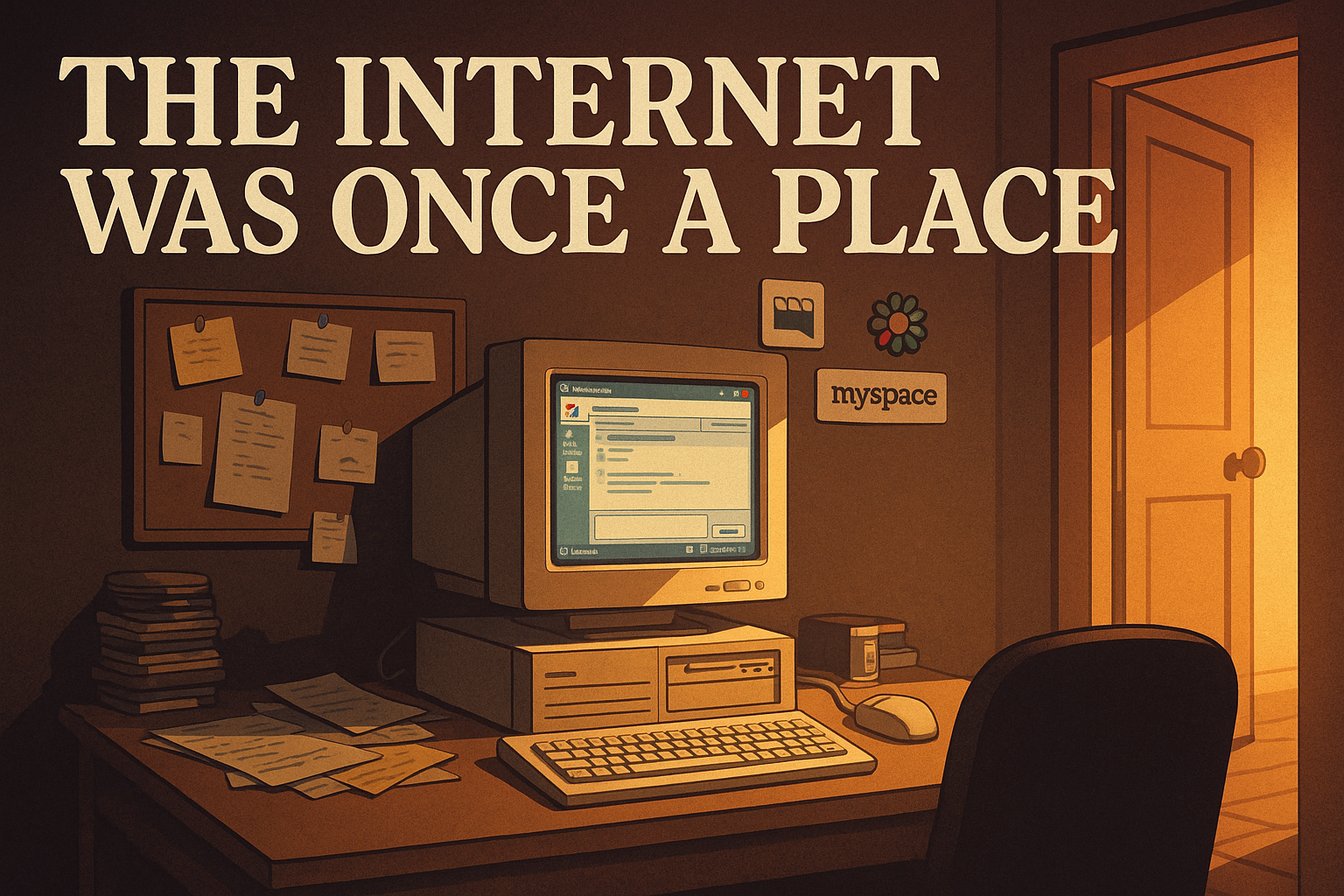Once, there was a door.
A real one. With a handle and a key.
It was the door of the room where the computer lived.
Big wooden desk. A mess of floppy disks, CDs and cables.
After school, I’d drop my backpack by the door and run at it. I had 30 minutes.
Thirty minutes of freedom, after begging for them like it was a matter of life or death.
The modem screamed—those weird, broken sounds.
But to me, that noise meant magic.
It meant I was going somewhere else.
MSN connected. ICQ went “uh-oh.”
Later, there was MySpace, with its messy, glittery pages.
But back then, those first chats felt like stepping into a secret world.
I wasn’t popular at school. I wasn’t the funny one, even if I tried.
But online, I was just… me.
I talked to people I didn’t know. People who knew nothing about me, but cared.
Sometimes we only shared a song.
Or a stupid meme. Or just… silence.
But it meant something.
Then, always the same voice from the other room:
“Dominic, that’s enough for today.”
or worse
“Dominic, I need to use the phone!”
The screen went black. MSN disconnected.
I closed the door behind me.
And that was it.
But that gesture—leaving the room—meant something.
And some part of me always stayed behind, on the other side of that door.
When the Internet Had a Soul
Yes, it was a bit dangerous.
But it was also beautiful.
There was this feeling—clean, honest.
Not everything made sense, but it didn’t need to.
We had no real names. No selfies.
Just our words. Just our minds.
Just us.
None of those people are still in my life.
They’ve all disappeared.
I’ve tried to find them. I really tried.
But it’s like chasing a ghost.
Geocities, Web Rings, and Digital Neighborhoods
Geocities was home.
You had your own address.
You picked a neighborhood. Area51 if you liked sci-fi. West Hollywood if you were queer.
Every page had visitor counters, blinking stars, maybe some MIDI music in the background.
And then there were Web Rings.
Tiny sites linked together by shared love for something—anything.
Aliens, Sailor Moon, your favorite band.
You didn’t scroll back then.
You clicked. You chose where to go next.
It felt like being in a living room.
People sat around a digital table and said:
“Look, this is what I love. What about you?”
Then Yahoo came.
Bought Geocities.
And started deleting things.
Just like that.
More than 1,000 people, erased overnight.
No warning. No respect.
And like that, a part of the internet died.
The Infinite Scroll and the Empty Field
Then came infinite scroll.
And now… it’s just this.
An endless gray field. No direction. No ending.
You scroll. You scroll more.
And when you close your phone, you don’t feel full.
You feel… hollow.
Sometimes it feels like I’m being watched.
I turn around. There’s nothing there.
But I feel it.
Something breathing behind me.
Hope: Rebuilding the Door
But something inside me still believes.
That it’s not over.
That there’s a way back.
Somewhere in the corners of the web, people are still making weird little things.
Personal websites. Handmade code. Thoughts that don’t fit anywhere.
No algorithms. No strategy. Just love.
Like drawing on the back of your notebook just because you feel like it.
Maybe that’s where we start again.
Not from tech. Not from progress.
From the threshold. From the doorway.
Maybe we can put the door back.
Between us and the chaos.
Between us and the feed.
Memory Is Not Death. It’s a Root.
Yes, I’m nostalgic.
But this isn’t about sadness.
It’s about memory.
And memory, if you let it, becomes a map.
I spent hours exploring frozen websites.
And when a page in Hypnospace suddenly updated, I jumped.
Because I had forgotten what it felt like.
The internet reacting.
Caring. Being alive.
So no, not everything is gone.
Those doors still exist.
Those neighborhoods. Those communities.
We just need to remember how to find them.
And have the courage to build a home again.
